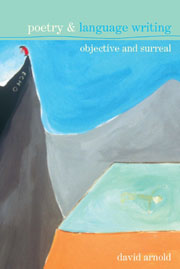Book contents
- Frontmatter
- Contents
- Acknowledgements
- List of permissions
- 1 The Scholarly Life of Language Writing
- 2 Surrealism: An Excommunicated Vessel?
- 3 Under the Sign of Negation: William Carlos Williams and Surrealism
- 4 The Surreal-O-bjectivist Nexus
- 5 Michael Palmer's Poetics of Witness
- 6 Scorch and Scan: The Writing of Susan Howe
- 7 ‘Just Rehashed Surrealism’? The Writing of Barrett Watten
- Notes
- Bibliography
- Index
5 - Michael Palmer's Poetics of Witness
- Frontmatter
- Contents
- Acknowledgements
- List of permissions
- 1 The Scholarly Life of Language Writing
- 2 Surrealism: An Excommunicated Vessel?
- 3 Under the Sign of Negation: William Carlos Williams and Surrealism
- 4 The Surreal-O-bjectivist Nexus
- 5 Michael Palmer's Poetics of Witness
- 6 Scorch and Scan: The Writing of Susan Howe
- 7 ‘Just Rehashed Surrealism’? The Writing of Barrett Watten
- Notes
- Bibliography
- Index
Summary
The complex temporality of influence
To shift from one of the foundational moments of Objectivism to the scene of Language writing is a leap that requires justification. Louis Zukofsky's ‘symposium’ with Parker Tyler and Charles Henri Ford, discussed at the end of the last chapter, may have raised significant tensions in the development of American literary modernism but it certainly did not resolve them. The accommodation of Surrealism continued to be awkward and contested. The advance of the Nazis across Europe made transatlantic passage a personal event for several Surrealists, including André Breton. Not that the presence of the ‘magus’ of the movement necessarily improved its standing in the United States. New initiatives did emerge: Breton began publishing VVV in New York in June 1942, while Ford took advantage of the flight from Paris to launch a longer-lived successor magazine to Blues, called View. Despite these developments, geographical proximity did not necessarily lead to cultural exchange. William Carlos Williams met Breton in 1941 at a party to welcome the French exile to the United States. According to his own recollections, his attempts at dialogue were haughtily dismissed.
In passing over this period, I am responding to the complex temporality which mediates the contact between Language writers and their ‘antecedents’. As we have seen (Chapter 2), when Ron Silliman scouts around for a work that will (almost) serve as a precedent for the ‘new sentence’, it is to Kora in Hell that he turns.
- Type
- Chapter
- Information
- Poetry and Language WritingObjective and Surreal, pp. 86 - 111Publisher: Liverpool University PressPrint publication year: 2007

